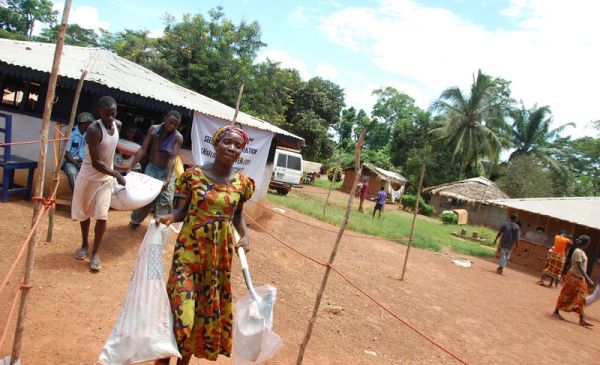
Susan Sandars meets Josephine, one of many farmers hosting refugees from Liberia, who has benefited from Oxfam’s food distribution program.
As Josephine Gbarwea waits in line at the Oxfam seeds and tools distribution in Bah Town, Grand Gedeh County in eastern Liberia, she explains why she’s sharing her home with 14 refugees from Ivory Coast: “They’re my family, I can’t let them go hungry. They came here with nothing and asked for my help.” Josephine’s kindness is not unusual; throughout the country thousands of Liberians, many of whom have been refugees themselves, have responded to the influx of refugees by sharing their homes, lives and food with their Ivorian neighbours.
But this generosity is taking its toll. With more than 90% of the 130,000+ Ivorian refugees in eastern Liberia living in local communities or “host communities”, pressure on already limited food resources has increased dramatically. It’s been five months since the last rice harvest and the food that many Liberians had saved up to eat is running out. Food aid distributions have prioritised refugees living in camps and transit centres. The vast majority of refugees living with host communities haven’t received any food. Their Liberians hosts have not received any assistance either.
Oxfam teams responding to the emergency situation in Liberia have found that many rice farmers are facing a critical situation. An assessment in Grand Gedeh County at the end of March revealed that food stocks were being exhausted, people were reducing their meals from three to one per day, prices of rice and cassava in local markets had doubled, and many people were collecting wild foods to eat or eating rice seed stocks intended for planting.
Food aid distributions are urgently needed both for refugees living in host communities and for host communities themselves. But if food aid alone is given to Liberian farmers, it could damage local markets, create dependency and discourage people from growing their own food. To avoid this and still ensure that farmers will have enough to eat in the coming months, Oxfam is distributing seeds and tools in Liberia’s Grand Gedeh County. We’ll help more than 10,000 vulnerable people in 22 communities over the next two weeks. We’ll give each household 25kg of rice seed, as well as sweet potato, hot pepper, aubergine and okra seeds to plant. We’re also providing a set of assorted and essential farming tools, including a cutlass, shovel, axe, hoe and rubber boots. So people don’t eat the rice seed they’re supposed to plant, Oxfam is also providing a “seed protection ration”: 50kg of rice per household.

For farmers like Josephine, who was one of the first to receive the seeds and tools, this timely intervention will make all the difference. “I have seven children of my own and right now we are struggling. Our food stocks are nearly finished, so I have been going to the bush to collect snails and palm cuttings, which I try to sell to buy food. Today I’m getting the major things that I need. Tomorrow I’ll go to my farm and plant. I’ll ask my family from Ivory Coast to help me.”
Find out more
Read about what else Oxfam has been doing to help those affected by the crisis in Ivory Coast and Liberia.